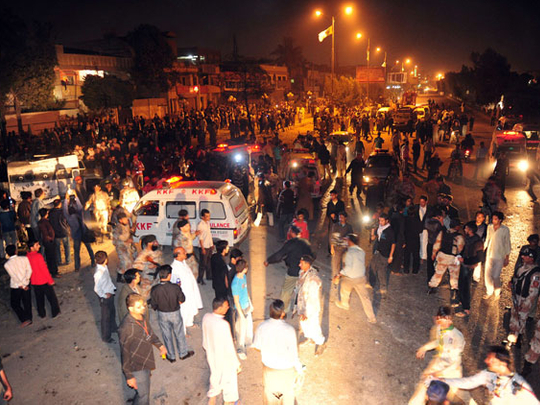
Islamabad: A few weeks before high-level talks between the two countries start in New Delhi, Pakistani intelligence and military officials have accused neighbouring India of "playing a dangerous game" by supporting, they claim, extremist groups believed to be behind recent bombings and target killing in major cities.
In interviews with Gulf News, senior officials from the Inter Service Intelligence (ISI) and the army said they "have evidence" of Indian involvement in the terrorist attacks in Pakistan's largest city of Karachi and even Lahore.
On Tuesday, a suicide attack on a police vehicle on Karachi's main highway left three dead, including two policemen. No one claimed responsibility but officials say they were certain that "foreign hands" were behind the attack.
Charges
A senior ISI official alleged that India attempts to "destabilise Pakistan" by supporting, by "funds and arms", militant groups in Karachi, the economic hub of the country.
Karachi has witnessed dozens of attacks and target killings over the past few years. Pakistani officials say the attacks, especially those on shrines, aimed at "fomenting sedition among religious communities" to destabilise the country.
"India is playing a dangerous game" in Karachi, a top ISI official told Gulf News on the condition of anonymity. He said his agency has "evidence" that Indian intelligence was arming and funding "extremist elements" to weaken their neighbour.
"People are getting money from India to create problems for Pakistan in Karachi" and other areas, he stressed. "India should understand that it will be affected most if Pakistan is destabilised," the official said.
Overstretched
Major General Athar Abbas, official spokesman of the Pakistani Army, said India realises that the Pakistani army is "over-stretched" because of the extensive anti-terror operations in the Federally Administered Tribal Areas. "Therefore, they support elements that engage in terrorist campaign on our urban cities," he said.
Abbas said India is being suspected of arming and funding extremist elements and even distributing anti-Pakistan hate literature in the Pakistani province of Balochistan, which borders Afghanistan.
Disputed Kashmir will be high on the agenda when the foreign ministers of the two countries meet in Delhi in the next two months, Pakistani Foreign Minister Shah Mahmoud Qureshi told Gulf News.
He said India and Pakistan should get over the reciprocal accusations and find ways to rebuild the trust.












